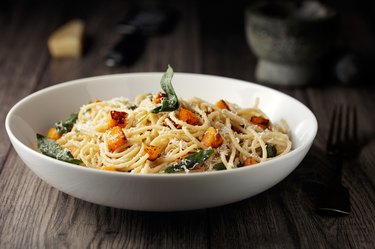
Ever feel swollen or puffy after eating a bowl of pasta or slice of bread? Eating foods with gluten can lead to swelling for some people for a few different reasons.
One possible culprit is gluten intolerance. Although edema or water retention isn't one of the most common symptoms of gluten intolerance, it's definitely possible. Read on to learn what a gluten intolerance entails and why you may be experiencing a little extra swelling after a bowl of carbonara.
Video of the Day
Video of the Day
What Is Gluten Intolerance?
Not to be confused with celiac disease (a chronic autoimmune disease), gluten intolerance is a condition where you feel sick, bloated, gassy or tired after eating gluten, a protein found in wheat, rye and barley, according to the Cleveland Clinic.
Also known as non-celiac gluten sensitivity, gluten intolerance means your body can't break down gluten well, so it causes abdominal pain, bloating, brain fog, fatigue and nausea. And although people with celiac disease have a lot of the same symptoms, their bodies don't process gluten the same way. When you have celiac disease, your body treats gluten as if it were a virus (aka an autoimmune response) in order to prevent damage to your digestive tract, according to the Cleveland Clinic.
Gluten intolerance isn't exactly a food allergy, either. A food allergy is when your immune system reacts to eating a certain food. Gluten intolerance is a digestive issue.
Symptoms of Gluten Intolerance
There are a few symptoms that may indicate you have a gluten intolerance, according to the Cleveland Clinic:
- Abdominal pain
- Bloating
- Gas
- Brain fog or fatigue
- Diarrhea
- Constipation
- Nausea
- Vomiting
- Skin rash
Edema and Gluten Intolerance
Edema is swelling in your hands, arms, ankles and feet caused by excess fluids trapped in your body, according to the Mayo Clinic. Often, edema-related swelling looks like puffiness right under your skin.
Edema is mainly caused by sitting in one position for too long or eating too much salty food, per the Mayo Clinic. In some cases, it can also be a side effect of certain medications, like high blood pressure medicine, anti-inflammatory drugs or estrogens.
Edema isn't a common side effect of gluten intolerance. However, you may experience some general water retention as a side effect of eating gluten with an intolerance. When you experience side effects like bloating or digestive unrest after eating gluten, it can cause your body to hold some extra water.
For the most part, gluten water retention shouldn't be too severe — you can expect it to go down within a day or two. But if your edema is accompanied by shortness of breath or difficulty breathing, this may be a sign of an underlying condition and in that case, visit the emergency room as soon as possible, according to the Mayo Clinic.
As mentioned above, mild edema usually goes away all on its own and is nothing to worry about. Moving your body, elevating the swelling or massage are a few home treatments that can help minimize your water retention, according to the Mayo Clinic. And if you notice swelling mostly in your legs, compression socks may also do the trick.
Was this article helpful?
150 Characters Max
0/150
Thank you for sharing!
Thank you for your feedback!
Is this an emergency? If you are experiencing serious medical symptoms, please see the National Library of Medicine’s list of signs you need emergency medical attention or call 911.